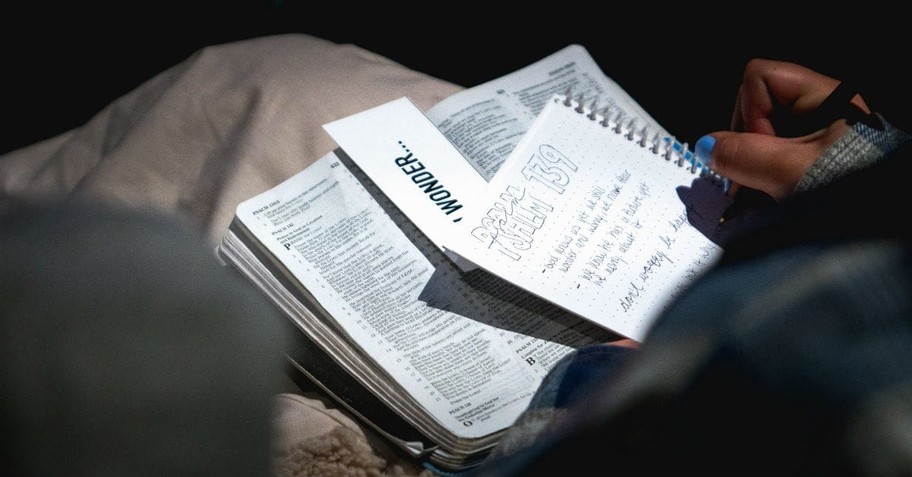Do you sometimes find yourself being envious of the people who start a Bible reading plan, follow it faithfully, and stick through until the end? Then, they start the same Bible reading plan the next year and persevere to the end again. I’m sorry, I just struggle with doing that. Sometimes I find that I get halfway through a Bible reading plan, get bogged down, and cannot go any further.
This used to create a load of guilt in my heart because I would get stuck in the middle of really good Bible reading plans. It’s happened to me with some great Bible reading plans– Robert Murray McCheyene, the Bible Eater, and Dr. Horner’s Bible reading plan. All of these plans are built around solid strategies for reading the Bible, but in my personal weakness, I struggle to persevere.
I doubt that I am the only person who has this struggle. If you struggle like I do, here is the advice that I would offer– change it up. Instead of choosing one Bible reading plan, choose a strategy for reading the Bible and then change what you are doing when you find yourself getting stale. After all, what matters is not that we are sticking to a plan, but that we are reading the Bible and being changed by it.
Here are four strategies for changing up the way that you read the Bible.
Photo Credit: Unsplash/Timothy Eberly

1. Read the Bible in Large Chunks
You can gain great benefit from reading an entire book of the Bible or a large portion of a biblical book in one sitting. When you read a large section in one sitting, you get to see how the Bible’s narrative unfolds and start seeing connections between one portion of Scripture and another. Also, because you are gaining a greater understanding of the whole of Scripture, this will help you understand a shorter passages context more fully when you begin to study it.
While this may seem like the most overwhelming strategy to undertake, it actually isn’t. In my ESV Audio Bible, it takes Max McLean thirty-eight minutes to read Genesis 1-11. We read much faster than that if we are not reading audibly, so it’s not unrealistic to think that you could read Genesis 1-11 with comprehension in thirty minutes.
Photo Credit: Unsplash/Daniil Kuzelev

"Sketch out a plan for what sections you want to commit to reading each day."
To execute this Bible reading strategy, figure out how long you want to set aside for reading each day. Then, take a study Bible and look at the outlines for the books of the Bible that you plan on reading. Sketch out a plan for what sections you want to commit to reading each day. Or, if you are dealing with a shorter book, commit to reading the whole thing in one sitting. The ESV Audio Bible’s reading of Ephesians takes about twenty minutes and Philippians is close to twelve. Reading these books of the Bible in one sitting with comprehension could be done in half an hour.
Photo Credit: Unsplash/Ben White

2. Read the Bible in Small Bites
When you read large portions of Scripture, you will consistently see passages where you want to slow down and read more carefully. Keep a list of these passages and when reading large sections starts to feel tedious, spend some time reading only one chapter or less each day for a while.
When you do this, make sure that you read with a pencil and a notebook. Write out what you are reading on your notebook. Skip a line so that you leave yourself room to write notes. Then, go through the passage slowly. Mark significant words. Look for words that the writer uses more than once. Take note of the connecting words like “for,” “therefore,” “but,” “so that,” or “in order that” and pay attention to how they connect one clause in the passage to another.
Photo Credit: Unsplash/Fineas Anton

"Take what you see and roll it around in your mind during the gaps in your day."
Also, read the passage out loud several times and see if you can pick up a flow to the way that it is written. Do you sense that there are some words the biblical writer would have emphasized if he were reading it to you? Read individual sentences repeatedly and emphasize a different word each time. Ransack the passage and seek to wring out every drop of truth that you can. When you are done, try to answer the questions that you jotted down and then spend some time writing out possible applications of what you read. Take what you see and roll it around in your mind during the gaps in your day. (William and Howard Hendricks’ Living by the Book outlines a great method for reading the Bible like this.)
Photo Credit: Unsplash/Christin Hume

3. Read the Bible with Repetition
As you read the Bible, you will find yourself drawn to books or passages that you want to know more deeply. The best way to do this is through consistent, repeated reading. It can be a week, two weeks, a month, or several months, but multiple readings of a passage will give you a grasp of its content, meaning, and application.
There are a couple of ways that you could accomplish this. For lack of a better term, the first is what I would call “The MacArthur Method.” (You can read about it here or in his book How to Study the Bible.) I once heard John MacArthur say that he did not want to be “concordance crippled.” In other words, he did not want to have to spend time trying to figure out where a passage is. He wanted to know Scripture well. To accomplish this, he read every book of the Bible for an entire month. For example, he would read Galatians every day for a month. When it came time to tackle longer books, he would divide them into manageable sections and read each section for a month.
Another way to tackle this would be to read one chapter of a book every day for several months. Last year, as our church got ready to start walking through Matthew’s Gospel, I read one chapter a day for six months. Many have also read Proverbs this way over the course of a year and greatly benefitted from it.
Photo Credit: Unsplash/Hannah Busing

4. Read the Bible on a Whim
In his book The Pleasures of Reading in an Age of Distraction, Alan Jacobs speaks of the joy of reading on a whim. He is talking about books outside of the Bible, but his advice would apply to our conversation as well. Jacobs registers his displeasure with lists that advertise “100 books everyone should read.” His reasoning is that plodding through lists like this can take the joy out of reading. Instead, he says that people should just read what they want to read.
Photo Credit: Unsplash/Aaron Burden

"...if you start finding your Bible reading plan to be tedious, take some time to just read what you want to read in your devotions."
Sometimes we should take his recommendation and apply it to our own Bible reading. While it is important to read the whole of Scripture, if you start finding your Bible reading plan to be tedious, take some time to just read what you want to read in your devotions. Do you have a favorite book of the Bible? Take some time off from your read the Bible in a year plan and reread your favorite biblical book. “But won’t this keep me from reading the Bible all the way through this year?” It may, but it is more important to read the Bible profitably than it is to read all the way through in a particular period of time.
I’ll be honest, I’m about to do this. This year, I have been reading three chapters of Old Testament each day and one chapter from the New Testament. Next week I will be in Job and 1 John. I struggle through Job 3-36 every year. Two years ago I preached through 1 John. Before I did so, I read one chapter a day for three months and memorized the book. I’ve been thinking a lot about 2 Corinthians lately and want to study it more, so I am going to read 2 chapters of Job, 1 chapter of 1 John, and 1 chapter of 2 Corinthians instead.
Photo Credit: Unsplash/Matt Botsford

Just Read the Bible
I cannot overstate the importance and the privilege of reading God’s word. In his word, God reveals himself to us and shows how he has been at work in our world. We see the glory of his Son and get to hear the treasures of who we are in him because of his life, death, resurrection, and ascension. The Bible tells us of the power of the Holy Spirit within us, the reality of our future hope, and how we live a life that brings glory to God and joy to us. Why would we not find every possible strategy for basking in the beauty of God’s word each and every day?
This article was originally published on ScottSlayton.net. Used with permission.
Scott Slayton serves as Lead Pastor at Chelsea Village Baptist Church in Chelsea, AL and writes at his personal blog One Degree to Another: scottslayton.net. He and Beth have been married since 2003 and have four children. You can follow him on Twitter: @scottslayton.
Photo Credit: Unsplash/Hian Oliveira
Originally published June 27, 2018.







